
foreword | Historical Narratives | Resources | Links | Contact
BROCK AT DETROIT
"I made a cool calculation of the pours and contras."
The destiny of Canada was suspended by the thinnest of threads. Risk and resignation were on every side in the stressful period preceding the commencement of the deadly struggle. As tension grew into crisis and crisis into climax the man who matched the peril was Isaac Brock. His vision and vigour were priceless assets to the province for he brought to his task imaginative leadership woefully lacking in the coming war. With daring the only course to follow Brock pinned his colours to the mast and inspired his faint followers with decisive command.[See Below *]
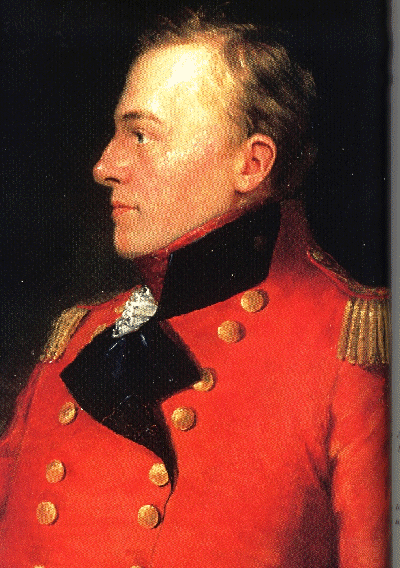 |
|
Isaac Brock |
The great British Admiral Lord Horatio Nelson said, "I am of the opinion that the boldest measures are the safest." Brock shared this philosophy and by early 1811 he had developed bold, offensive campaign plans for the defence of the province. Basing them on rapid, aggressive, successful strokes, Brock hoped to revive public confidence in the cause and rouse surging spirit in thousands of hearts - the vital dynamic in the human story.
Brock knew that early victories would impress Aboriginal tribes whose alliance in the coming conflict he considered critical. The capture of Fort Michilimackinac attracted the tribes to the British side and ensured the allegiance of Natives in the northwest. The American surrender of this garrison triggered the northern tribes - Chippaways, Saultes, Winnebagoes, Crees and others - to take the war path for the king. Their presence throughout the conflict was vitally important.Their numbers included the great Shawnee chieftain, Tecumseh, "Shooting Star," a fitting soubriquet for he flashed forth onto the northwest frontier pledging the protection of Native territory and traditions. He knew once their land was lost their freedom would follow. Tecumseh was described by one historian as "the ideal of an Indian chief: stately and commanding yet tense, lithe and observant." He was always ready to spring despite a limp caused by a wound received in a previous battle. Known as a skilled and fearless warrior Tecumseh was held in high esteem by friend and foe alike. His impressive nobility and passionate eloquence amazed British and American politicians.
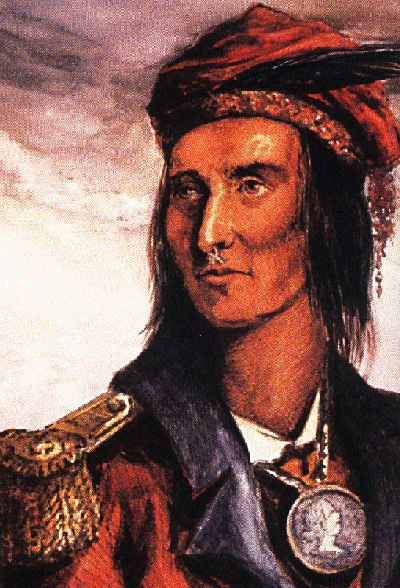 |
|
Tecumseh - "Shooting Star" |
Tecumseh was an heroic ally to Canadians and respected as an honourable enemy by Americans who fought bravely to defend his people. During a lifetime lived in the midst of combat and savagery, he never lost his merciful spirit and deep loathing of cruelty. He preserved throughout that brutal period a rare humanity and compassion towards his captives. His life stood for "the essential nobility of self-sacrifice and the occasional triumph of the human spirit." By 1792 Tecumseh was the acknowledged leader of the Shawnees who resolutely opposed every concession of land to the whiteman. The motivating force in his life was opposition to the settlers' insatiable drive to acquire ever more land. Tecumseh opposed the American purchase of two and one-half million Aboriginal acres in 1809 and vowed he would never submit to the surrender of Aboriginal land.
In an attempt to stem the loss of land, Tecumseh dedicated himself to building the fragmented First Nations into a Native Confederacy stretching from the Great Lakes to Mexico. One of his legendary trips covered 4800 kilometres in six months. He used his fiery eloquence to urge Native tribes to join in a common front and his persistent pressure kept the frontier in a state of agitation. Fearful of Tecumseh's plan to unite the tribes against American encroachment, William Henry Harrison fought and defeated an Aboriginal force on November 7th, 1811. Led by Tecunseh's brother, the Prophet, Native braves met Harrison at Tippecanoe Creek, Indiana where there were heavy losses on both sides. Following the withdrawal of Aboriginal forces, Harrison proceeded to burn the Native settlement at Prophetstown, the home on the upper Wabash River of Tecumseh and the Prophet. At the time of the battle Tecumseh was absent in the south seeking support for his confederation.
This defeat redoubled Tecumseh's determination to oppose the Americans and when the War of 1812 began he quickly allied himself and his people with the British, not because he supported their cause but in order to use Britain's military might to fight what he considered a more insidious threat to Native interests - the unrestrained growth of the United States.
In His Own Words
"Send them back whence the whites came. Back to the great water whose accursed waves brought them to our shores. War now. War always. War on the living. War on the dead."
Canada in the early 19th century was compared by one historian to a tree with its tap roots at Halifax, its deciduous branches in Upper Canada and its nourishment flowing across the ocean from Britain. A successful American amphibious assault on Halifax by land and sea forces would have severed Canada's major source of supplies, thus crippling the country's defence capability. The remaining isolated strongholds could then have been picked off one by one at leisure or forced to submit for lack of supplies. A land attack on Montreal would have been more feasible but it was never seriously considered. Instead as part of their early strategy the Americans decided that thrusts would be made into Upper Canada from Detroit and from Niagara.
William Hull, governor of Michigan Territory was placed in command of Fort Detroit, a square enclosure of about two acres surrounded by an embankment, a dry ditch and a double row of pickets. Although capable of withstanding a siege, the fort did not command the river. I had insufficient supplies for a lengthy period and was two hundred miles from the nearest base of support. Hull went to Washington with a plan to force the British to abandon Upper Canada by menacing them with an army at Detroit. British ships on Lake Erie would then fall into American hands and thus spare the country the cost of building a fleet on the Great Lakes. The prospect of acquiring a vast province and lake fleet with a relatively cheap show-of-force was appealing, so President Madison agreed to a Canadian conquest. Raids were to be launched at Detroit and Niagara.
Hull, "a short, silver-haired, corpulent, good-natured old gentleman, who bore the marks of good eating and drinking," declined at first to lead the assault, but pressed by Madison to undertake that role, Hull against his better judgement accepted the rank of brigadier general and allowed himself to be appointed commander of the Northwest Army. Like Brock Hull was mindful of the importance of the role of the Native warriors and control of the lakes. In the event of war Hull predicted the British would move against Detroit and Michilimackinac "with a view to obtaining the assistance of the Indians."
On July 9th William Hull received authorization from Washington to invade Canada. "Should the force under your command be equal to the enterprise, consistent with the safety of your own post, you will take possession of Malden and extend your conquests as circumstances may justify." Wavering between optimism and pessimisim, Hull cautioned, "I do not think the force here equal to the reduction of Amherstburg (Malden) and you must not, therefore, be too sanguine." En route into Canada Hull was pleased to meet the schooner Cuyahoga on which he hoped to rid himself of much of the luggage he was carrying. He hired the vessel to carry his baggage, medical supplies and most importantly a trunk filled with confidential military papers. Since he knew the British controlled Lake Erie and that the vessel would have to pass under the guns of Fort Malden, this was a risky move. Meanwhile on the opposite side of the river at Amherstburg the small British garrison was reinforced by the flank companies of two Essex regiments. As they waited and watched the Americans preparing to attack them, some of the militiamen lost their enthusiasm for conflict and scarcely concealed their anxiety to go home.
On July 12, 1812 Hull's forces crossed the Detroit River and invaded Upper Canada taking peaceful possession of the village of Sandwich. Fort Malden, which was weakly built and weakly held, did not resist their crossing much to Brock exasperation. Hull, however, made no attempt to seize the fort and the British garrison of some two hundred regulars of the 41st Regiment continued to occupy the fort at Amherstburg [**] and the territory around it presenting a constant threat to the American flank. Hull's orders were to march to the Thames area. The Americans' order of march was as follows: the advance guard of riflemen; the major part of the army in two columns flanking the baggage and command centre. These columns in turn were flanked by riflemen in open columns. Finally there was the rear guard of riflemen. The army on the march was a sight to be seen from afar, its snake-like columns winding across the countryside occasionally disappearing from view behind a hill. At night they camped within a square breastwork of fallen trees while mounted scouts reconnoitered for several miles in all directions.
Hull encamped at a pleasant expanse of meadowland and serenely hoped the conquest of Canada would result merely of his appearance. In a proclamation [***] to the Inhabitants of Canada that piled up passion and hyperbole, Hull pronounced, "The army under my command has invaded your country. You are separated by an immense ocean and an extensive wilderness from Great Britain. To peaceable inhabitants my army brings neither danger or difficulty. I come to find enemies, not to make them. Raise not your arms against your brethren. Being children of the same family and heirs to the same Heritage the arrival of an army of Friends must be hailed by you with a cordial welcome. You will be emancipated from Tyranny and oppression and restored to the dignified state of freedom. I come prepared for every contingency. I have a force which will look down all opposition."
Hull declared that should any white man be found fighting by the side of an Indian, "instant destruction will be his lot." Brock's comment on this threat was cited in the London Times, September 29, 1812. "By what new principle are they (the Indians) to be prohibited from defending their property? If their warfare, from being different from that of the white people, be more terrific than that of the enemy, let him retrace his steps. They seek him not and cannot expect to find women and children in an invading army." Brock said the execution of Hull's threat would be considered "deliberate murder."
Hull's proclamation was characterized by "absurdity, falsehood and Yankee brag." Despite being within easy striking distance of Amherstburg and with the odds four to one in his favour, Hull followed his pompous proclamation not with forceful action but with flight. He sought security in Sandwich (Windsor) where for a month he wasted valuable time and frittered away his forces in different directions. Finally, he retreated to the safer side of the river. Two events unnerved him. News that Brock with British regulars was en route from Niagara to Fort Malden Even more disturbing was the report that Fort Michilimackinac had been taken by the British and that this had unleashed huge numbers of Natives now flooding down from the northwest. Hull came; he saw; he fled.
While Hull's bombastic proclamation was ridiculed at the time and angered most loyal citizens, Brock feared
In His Own Words
"The insidious proclamation was having a considerable effect on the minds of the people."
Brock's fears were well-founded for many of those living in this part of the province were newly arrived Americans, some three hundred of whom immediately sought protection in the American lines. Hull was accompanied by two residents of Upper Canada who were American sympathizers and who later returned to their homes in Upper Canada where they distributed copies of Hull's proclamation and circulated a petition eventually signed by 400 residents requesting Hull when he did invade Canada to provide protection for those refusing to take up arms against the Americans. Brock feared this kind of disloyalty was contagious and he ordered a loyal militiaman to "organize a force to overawe the disaffected." A number of the dissidents were quickly identified and within a few days imprisoned. [****]
In order to provide support for the small force at Amherstburg in the event it was attacked by Hull, Brock informed Prevost on July 29th, "I propose collecting a force for the relief of Amherstburg." On the night of August 5th, the same day he prorogued the Legislature, Brock sailed from York to the head of Lake Ontario on his way to Amherstburg where he expected hot and heavy tidings.
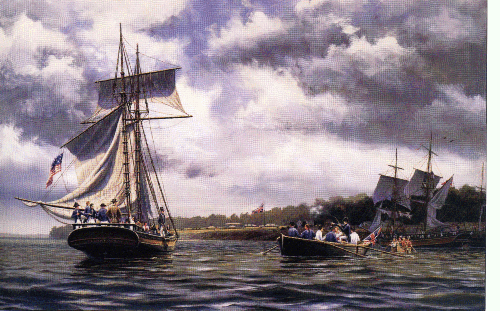 |
|
Capture of the Cayauga |
On July 1 the British brig, General Hunter, captured the American schooner Cayauga. On board were sick militiamen, medical supplies and some musicians and their instruments. The British declared the militiamen prisoners of war, ran up the Union Jack and ordered the musicians to play God Save the King. The vessel also carried General Hull's personal stores, clothing and a chest containing official correspondence and complete muster rolls and records of the army. Cayauga's capture was a severe blow to Hull. The badly needed medical supplies were almost irreplaceable and the loss of his papers disclosed to Brock more about Hull's army than Hull himself - its strength, character and general campaign expectations.
Prior to leaving for Amherstburg Brock learned that militiamen in the Norfolk area were opposed to marching to the relief of that garrison. Fearful of the effect this would have on other residents of Upper Canada, he acted quickly to address the crisis. From Burlington Bay Brock headed overland to Brant's Ford on the Grand River where he secured the Natives' allegiance to the British cause. He travelled to Culver's Tavern in Norfolk where he gave an impassioned speech to the reluctant militiamen. It had the desired effect and members of the Norfolk militia turned out to a man. Subsequently both the Norfolk officers and the men were highly praised by Brock for their contribution to the cause at the assault on Detroit. Two officers actually received medals.
Brock proceeded to Long Point on Lake Erie where on August 8th he embarked his "mass of manoeuvre" comprising 50 regulars and 260 militia chosen for the boating skills and knowledge of the Erie shoreline. In ten small, dilapidated vessels they sailed along the Lake Erie shoreline, hugging the treacherous coast as they proceeded with all the speed the heavy weather permitted. They carried with them two 'grasshoppers' cannons. After five days of slow progess and incessant exertion in the ramshackle fleet, they covered the 300 kilometres and reached Amherstburg at midnight on Thursday, August 13th.
Brock was pleased with the soldiers' stamina during the rough and rugged voyage. "In no instance have I seen troops who have endured the fatigue of a long journey in boats during extremely bad weather with greater cheerfulness and constance and it is but justice to this little band to add that their conduct excited my admiration."
When they arrived all were relieved to learn that Hull's invasion had collapsed. Local militiamen and civilians carrying torches cheered Brock's arrival. When he stepped onto the wharf, Tecumseh and 500 Shawnee fired their muskets into the air. Always mindful of of the need for economy, Brock asked a local Indian agent to tell them to save their ammunition for the Americans. Even though it was past midnight Brock summoned the garrison officers to an early morning meeting. Joined in the officers chambers at Fort Malden by Tecumseh and various other chiefs they planned their offensive by lamplight.
Brock and Tecumseh, an impressive pair, hit it off immediately. As fighting men they were cut from the same cloth. The auburn-haired, blue-eyed Brock was a massive man and his scarlet coat with gold epaulettes made him appear even bigger. Tecumseh in tanned deerskin was equally tall, his hazel-brown eyes beaming confidence, strength and optimism. Brock asked Tecumseh to describe the country across the river. Taking a roll of elm bark and extending it on the ground with four stones, Tecumseh sketched with his scalping knife a very detailed outline of the country - its hills, woods, rivers, roads and morasses. Brock was impressed. Sensing he was dealing with a superior person and important ally, Brock shrewdly bestowed on Tecumseh the rank of a brigadier-general in the British army. In a letter to Lord Liverpool Brock wrote, "Among the Indians I found at Amherstburg, I found some extraordinary characters. He who attracted most my attention was a Shawnee chief, Tecumseh. A more sagacious or gallant warrior does not, I believe, exist. He was the admiration of everyone who conversed with him"
The officers at Fort Malden and particularly Colonel Procter had real concerns about the wisdom of launching an attack and advised against crossing the broad river to face a formidable force of 2000 men behind 22-foot ramparts protected by a palisade of 10-foot hardwood spikes, all defended by 33 cannons and an 8-foot moat. Despite officer opposition Brock decided to take a "calculated risk." He believed that battles were won by superior will power. His resolution enabled him to prevail over the intimidating circumstances, the reluctance of his officers and subsequently over his enemy. Where the majority judgement counselled 'cannot', his will counselled 'can'. In this extremity great results were gained when his will overrode judgement. Despite the overwhelming advantages the Americans appeared to have, Brock's force and drive outweighed them. One of Brock's most "invaluable qualities" was his willingness "to carry the war" into the United States.
Brock immediately set about implementing part two of his strategic plan: the storming and capture of Fort Detroit. On the 14th Brock reconnoitred the frontier and on the 15th he oversaw the placement of shore batteries which commenced bombarding Fort Detroit around 4 p.m. Despite the fact that they were merely "showing their teeth" with their random artillery fire, the British artillerymen began to get the range and a single shell killed for officers. The crashing cannonade further dismayed the disheartened Hull.
During the night Tecumseh and 600 braves, their names "throbbing like distant war drums" - Shawnee, Miami, Fox, Sac, Ottawa, Wyandot, Chippewa, Potawatomi, Winnebago, Dakota - crossed to the American side two miles down river from where they slipped through the woods and entered the upper part of town.
Earlier while Hull was on his way to assume command of Fort Detroit with one regiment of regulars and three of Ohio militia he had been plagued with problems. Continuous rain mired the men in mud and the Ohio volunteers were in a mutinous mood because they had not been paid. Hull decided to speed up their march by off-loading heavy baggage, his official papers and sick soldiers onto the schooner Cayauga. As indicated above this vessel was subsequently intercepted by the brig General Hunter opposite Fort Malden and forced to surrender. The captured correspondence was a great coup for Brock for it indicated American morale was low and Hull was depressed and desperate. This good news was confirmed by reports carried on the Native "bush telegraph". Brock's decision to attack displayed the offensive spirit that wins battles.
In the early morning hours of the 16th Brock's mobile force crossed the Detroit River. His "gallant band," comprised 250 regulars of the 41st Regiment, 50 soldiers from the Royal Newfoundland Regiment, 400 Upper Canadian militiamen and Native warriors.
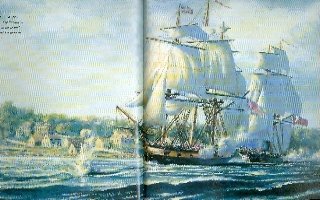 |
|
Provincial Marine's most powerful vessel on the Detroit frontier Queen Charlotte and General Hunter
|
They surged across just north of what is now Windsor, their crossing well supported by cannon fire from shore batteries in Canada and under cover of the fire from their ships of war," General Hunter and Queen Charlotte. With the blasting concentrations of artillery, Brock hoped to pound and batter the enemy's vital positions and force them to expose their divisions upon the anvil of the British blows. Accompanying the cannon fire were the hair-raising war whoops of the Native braves who had crossed earlier.
Brock, in full dress, tight-fitting scarlet coat with gold lace and buttons, cocked hat, white trousers and glistening black Hessian riding boots led the way. Tecumseh was quick to notice and comment."Other chiefs say 'Go' he says 'Come.'" Warfare was entirely new to the militiamen and the sturdy yeomans' hearts raced as they held their flintlocks at the ready on what was to become that historic Sunday. The sun's rising rays shimmered on the buttons and bayonets of the red-coated regulars presenting tantalizing targets in their scarlet tunics, red shakos and colourful sashes, belts, braids and buttons.
Brock had the psychological upper hand so vital in warfare. He knew of his foe's fear of the Aboriginal warriors and played on Hull's horror in his ultimatum to the Americans. His proclamation to Hull stated forebodingly, "It is far from my inclination to join in a war of extermination, but you must be aware that the numerous body of Indians who have attached themselves to my troops will be beyond my control the moment the contest commences."
Brock believed that all warfare was psychological and that performance was everything. In a letter to his brothers dated 3 September 1812 he gave this reason for attacking a numerically superior enemy force. The criticism he faced for taking such a risk was motivated Brock believed by envy.
In His Own Words
"Some say that nothing could have been more desperate than the measure I took but I answer that the state of the Province admitted of nothing but desperate measures. Confidence in the American General was gone and evident despondency prevailed. I succeeded beyond expectation. I crossed the river contrary to the opinion of my colonels and it is no wonder that envy should attribute to good fortune what in justice should be credited to my own discernment. I proceeded from a cool calculation of the pours and contres."
In war officers may lose in a day what they have spent years building up. The white-haired Hull had been an impressive leader who had fought in nine battles during the Revolutionary War but that was thirty years before. It was said of him that "in 1777 he would have fought or died without care. In 1812 with not much of his life left, he was fearful of losing that little." Hull's bombast was not matched by bravery and his reputation was about to be ruined. Faced with inexperienced troops, wholesale desertions from the American militia, the havoc caused by heavy cannon fire. Cascading cannon balls rolling around could sound as though thunder itself had entered the room. In the face and fear of the cannon fire, the blood-curdling clamor of tomahawk-toting warriors and all those redcoated regulars [*****] advancing on the fort, Hull's fighting spirit fled. He drooped when he stood up and sagged when he sat down.
Instead of the greetings and warm, welcoming handshakes of friendship Hull had expected from Upper Canadians, he faced the cold steel of Brock's bayonets. He became mentally and morally paralyzed, responding like a puppet to the manipulations of Isaac Brock. During times of extreme stress, Hull stuffed his mouth with quid after quid of chewing tobacco until its dark drool ran down his beard and onto his chest. Now as spittle spilled out of his mouth onto his beard, his neck-cloth, cravat and vest, he reacted on terrified impulse.
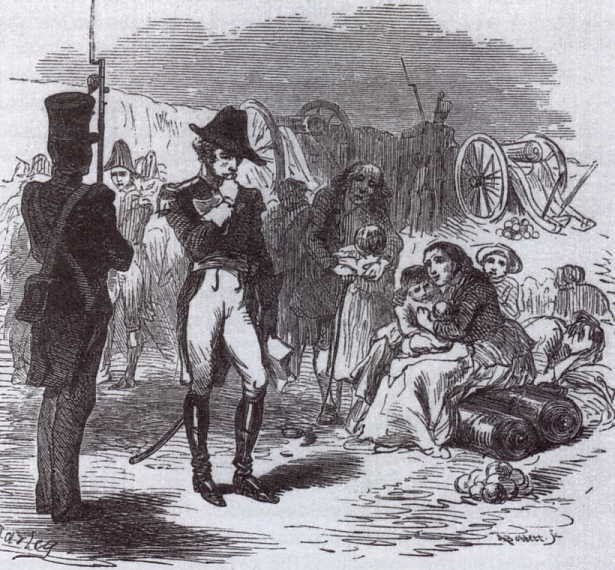 |
|
Brigadier General Wm Hull Broods About Brock
|
Fearing defeat and the awful consequences for civilians that included his daughter and grandchildren huddled within the walls of the fort, Hull capitulated. He saw surrender as the only way to prevent a slaughter. Without consulting any of his officers he sent his son to signal surrender. Hull had overstayed his welcome on the stage of history.
According to a ballad of the time:
"Those Yankee hearts began to ache,
Their blood it did run cold.
To see us marching forward
So courageous and so bold.
Their general sent a flag to us,
For quarter he did call,
Saying, ''Stay your hand, Brave British boys,
I fear you'll slay us all."
A very harried Hull astounded Brock with the following letters.
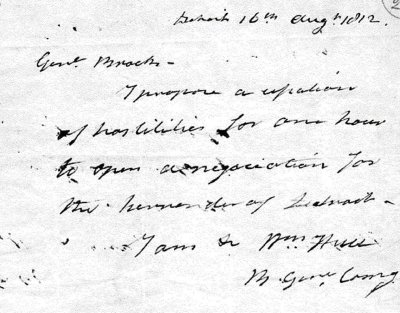 |
|
"General Brock, I propose a cessation of hostilities for one hour to open negotiations for the surrender of Detroit."
|
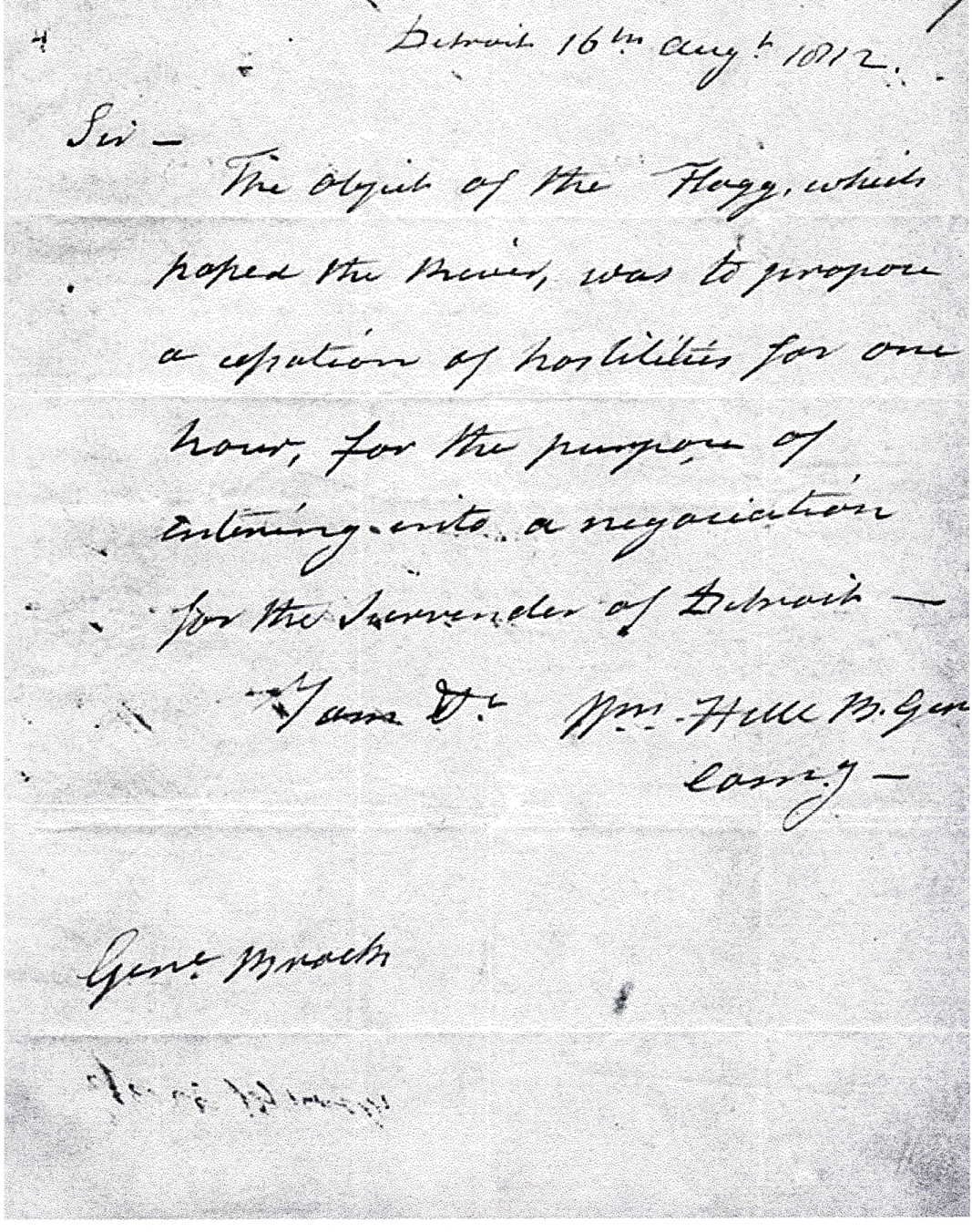 |
|
"Sir, the object of the Flagg, which crossed the River, was to propose a cessation of hostilities for one hour for the purpose of entering into a negotiation for the surrender of Detroit."
|
To the stunned amazement of Brock a white flag suddenly appeared above the ramparts of the fortress. Hull was surrendering his fort without firing a shot. Brock appointed his military aide-de-camp, Major John Bachevoye Glegg and his provincial aide-de-camp Lieutenant-colonel John Macdonell "to conclude any arrangement that may lead to prevent the unnecessary effusion of blood." Within an hour they returned with the conditions of the American capitulation. The battle had been the business of a minute.
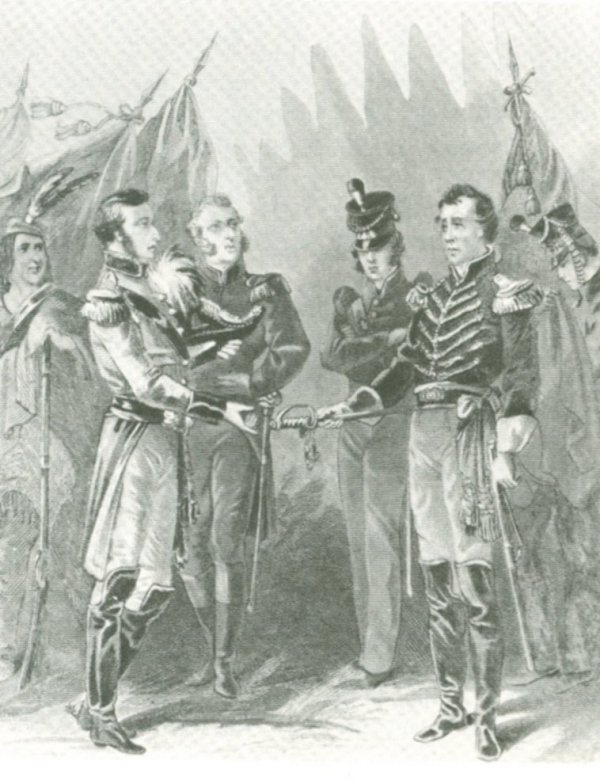 |
|
Hull's Surrender to Brock |
Shortly after noon on Sunday, August 16, 1812 the British entered the fort, lowered the American flag and while a salute was fired from a recaptured cannon (first taken from the British in the American Revolution), the band triumphantly played God Save the King and hoisted the Union Jack. After an absence of sixteen years the British flag flew again over Detroit. In two months the Americans had lost the west and lost it in ignominy, their senile general delivering up an army he had not even ordered into battle.
A victory parade was held the next morning in front of the fort which included a march past of militiamen, redcoats and the invaluable Native allies. Brock took the salute in full military dress of scarlet-and-gold mounted on his great charger, Alfred.
History is full of contingencies, moments when "the touch of a feather can alter the course of human events." Using a combination of bluff and blackmail, Brock with a tiny attacking force captured a Yankee army of 2,500, some thirty-three cannon, four hundred rounds of 24-pound shot, one hundred thousand cartridges, 2500 rifles and bayonets, umpteen barrels of gunpowder, a number of horses and a newly built 16-gun brig Adams which was rechristened Detroit. Far more important than these much-needed weapons of war, the triumph of Brock's gallant band fostered hope over heavy-heartedness. The fire of their valour began to inflame a few hearts.
In his message to General Prevost Brock wrote, "When I detail my good fortune Your Excellency will be astonished." While Brock reaped great credit for this victory, without the aid of Tecumseh and his Aboriginal warriors it would not have been so easily achieved, a fact that Brock willing admitted. Tecumseh recognized Brock's decisive leadership and congratulated him on his triumph over the Long Knives.
In His Own Words
"The Americans endeavoured to give us a mean opinion of British generals but we have been witnesses to your valour. We observed you from a distance standing the whole time in an erect position and when the boats reached shore you were the first man on land. Your bold and sudden movements frightened the enemy and so compelled them to capitulate to half their number."
To recognize Tecumseh's role in the triumph, Brock instinctively removed his richly tasseled scarlet sash and fastened it about the great chief in the presence of the troops and Native warriors. He also gave Tecumseh a brace of silver-mounted pistols in token of his admiration. The Shawnee chief slipped the arrow-patterned Native sash from around his waist and presented it to Brock. The next morning when Brock noticed that Tecumseh was not wearing the sash and inquired why, Tecumseh responded, "I have given to it Round Head of the Wyandots who is older and more valiant than I." Round Head was a prominent warrior at Detroit and he remained a valiant ally until his death. The two esteemed men, allies for just five short days, were soon to be united by a hero's death. Brock's came first for two months later he was felled by a bullet to the breast. He was wearing Tecumseh's sash.
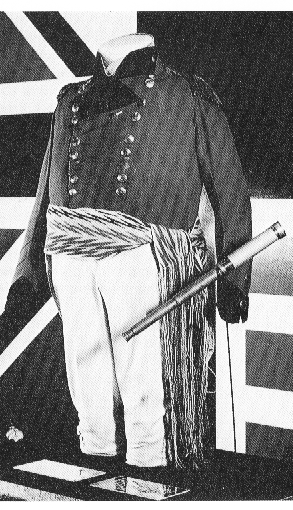 |
|
Brock, the Bullet Hole & Tecumseh's Sash |
News of the spineless surrender of Detroit rocked the United States which up to now had been in the words of one writer, "basking in the valor of ignorance." American historians, called the surrender of Fort Detroit the most humiliating capitulation in American history. President Madison and the War Hawks of Washington could hardly believe the news. Americans were outraged at the abject defeat of a major, military force without firing a shot. The New York Post reflected this fury in an editorial dated August 31st, 1812. "On the disgraceful and deplorable results of our first military efforts in Canada, we are not in a temper to say much. The whole plan of the campaign was miserably imbecile and utterly inefficient yet such a catastrophe as is just announced was beyond our most gloomy apprehensions. It appears we must be utterly unequal to cope with the experienced veteran British officers in Canada."
Another newspaper editor raged."A recent event has fired the soul of every lover of his country at the disgraceful evacuation of Detroit. Every circumstance that we have yet heard of marks villainy and treason in its strongest colours. What would induce General Hull and the General Officers to evacuate Detroit God only knows." This was only the first sip, the first foretaste of a bitter cup from which the Americans were to drink deeply in the next few months.
An American prisoner, surgeon's Mate James Reynolds, kept a journal of the days he was imprisoned following the British capture of Detroit.
16th - Sunday. Pleasant weather but unpleasant news. We heard about noon that Hull had given up Detroit and the whole Territory of Michigan. The Indians began to return about sunset well mounted and some with horses and chains. Who can express the feelings of a person who knows that Hull had men enough to have this place three times and gave up his post. Shame to him, shame to his country, shame to the world. When Hull first came to Detroit the 4th U. S. Regt. would have taken Fort Malden and he with his great generalship has lost about 200 men and his Territory. Can he be forgiven when he had command of an army of about 2500 men besides the Regulars and Militia of his Territory and given up to about 400 regular troops and Militia and about 700 Indians.
17th - Monday. Cloudy. The news of yesterday was confirmed. The Indians were riding our horses and hollowing and shouting.
The prisoners of war including Hull were conveyed to Quebec in parties, some going in vessels of war from Niagara to York to Kingston. Some were transported in small boats along the shore and across the Carrying Place by the Bay of Quinte. Most were confined in hulks in the St. Lawrence at Quebgec, where they remained until they were exchanged. One observer present when Hull alighted from his carriage at Fort George recorded that the general looked "quite corpulent" and appeared "hale and in high spirits." Once the surrender was accomplished Hull emerged from his catatonic state much like a man coming out of anaesthetic. Scarcely able to speak or act during the conflict he now became both loquacious and lucid.
In His Own Words
"I have done as my conscience directed. I have saved Detroit and the Territory from the horrors of death and destruction."
Hull knew he would be censured for his actions but did not fully understand the magnitude of his mistake. Canadians looked on in awe and astonishment as Hull and his 582 regulars were marched through the streets of Montreal. In his report on the fiasco to members of the Senate and House of Representatives, President Madison said,
In His Own Words
"Brigadier-General Hull passed into the neighbouring territory of the enemy with a prospect of easy and victorious progress. The expedition, nevertheless, terminated unfortunately, not only in a retreat to the town and fort of Detroit but in the surrender of both and of the gallant corps commanded by that officer. The causes of this painful reverse will be investigated by a military tribunal."
In 1814 Hull was tried by a general court-martial with treason, cowardice, neglect of duty and conduct unbecoming an officer. The court did not consider the charge of treason but found him guilty on the other charges and sentenced him to be shot. However, because of his "revolutionary services and advanced age," his life was spared but he was cashiered from the army. Hull spent the remainder of his days attempting to prove his innocence and justify his actions. He had a fort filled with women and children and the old people of the town and feared for their deaths at "the hands of the the Indians." Brock played on this fear when he mobilized the Aboriginal warriors and warned Hull of the possible consequences of their actions once fighting began. Brock's situation was desperate. "The loss of his province by neglect of any resource at his command might properly have been punished by the utmost penalty his government could inflict."
Brock's tiny force was the knife's edge that opened the oyster. The incredible accomplishment of a small force from a colony of 600,000 people had resulted in the deception and capitulation of a major fort of a nation of seventeen states, six territories and 7.5 million people. Prize money was promised to the young men who had participated in the raid but it was very slow in coming and was still not paid to them by 1817. In a subsequent message to Prevost Brock proudly reported that not one life was lost after the fort had surrendered. Prevost was highly impressed and congratulated Brock on his "singular judgment, firmness, skill and courage." News of the victory was carried throughout the province by messengers riding night and day on the fastest horses they could find. When word of the rout reached York on August 20th the tiny capital erupted in celebration.
The astounding news made front page headlines.
GLORIOUS NEWS!!!
Dispatches have just now arrived from General Brock dated August 17th, 1812, stating that he took possession of that important post {Detroit} on the 16th without the sacrifice of a drop of British blood. Every individual together with their General was animated with the most glorious spirit. Upwards of 2,500 Troops have surrendered prisoners of War and about 25 pieces of Ordnance have been taken. Thus it hath pleased Providence to crown his Majesty's Arms with an early and important victory.
Herald Office, half past three, Tuesday August 25, 1812
MORE GLORIOUS
We have not time to publish an Extra but an express has just arrived from General Brock with advices that on the 15th inst. General Hull surrendered with 2,500 men, 25 pieces of cannon and all his stores to British arms without the loss of a life on our side. This is all that has transpired as the dispatches are just gone off to His Excellency who is at present at the Camp. We congratulate you on this truly glorious news in great haste and we are very sincerely,
Your most obdt. Servts.
The Editors of the Herald.
Canada was ecstatic. "The inhabitants were thrown into a frenzy of delight by the almost incredible intelligence that Detroit had been taken along with the entire American army." The news brought the country to its feet. The jubilation of the people of the province knew no bounds at this bloodless victory. Canadians could scarcely believe the news even after it became well known. An American officer exclaimed, "This event has animated Canada beyond anything you can conceive."
The victory stirred the passions of the people like nothing else could have. The American dream of an easy conquest had been shattered. But more than that, British successes under Brock really ended the danger of Upper Canada yielding to the Americans. The Loyalists were the backbone of the militia but the success at Detroit caused the indifferent majority, many of whom fully expected the army of the republic to march in triumphal procession through the province, to rapidly reconsider their loyalty. Support for the United States quickly melted away. The victory could be compared to a stone flung into a pond - the ripples radiating in all directions electrified people at all levels to get behind the government.
Later the pillage and destruction experienced at the hands of the U.S. forces on Upper Canadian soil made even the most cynical see the American military as invaders not liberators. Residents considered unreliable now openly committed themselves to the British cause, a commitment they found hard to renounce in the darker days ahead.
Canadian exuberance and bravado at the event are reflected in the following ballad from that period.
THE BOLD CANADIAN
Come all ye bold Canadians,
I'd have you lend an ear
Unto a short ditty
Which will your spirits cheer
Concerning an engagement
We had at Detroit town,
The pride of those Yankee boys
So bravely we took down.
Those Yankees did invade us,
To kill and to destroy,
And to distress our country,
Our peace for to annoy.
Our countrymen were filled
With sorrow, grief and woe,
To think that they should fall
By such an unnatural foe.
At length our brave commander,
Sir Isaac Brock by name,
Took shipping at Niagara,
And unto York he came.
Says he, ye valiant heroes,
Will ye go along with me
To fight those proud Yankees
In the west of Canada?
Our General sent a flag to them
And thus to them did say:
"Surrender up your garrison,
"Or I'll fire on you this day."
Those Yankee hearts began to ache
Their blood it did run cold
To see us marching forward
So courageous and so bold.
Their general sent a flag to us,
For quarter he did call,
Saying, "Stay your hand, brave British boys,
"I fear you'll slay us all."
"Our town, it is at your command,
"Our garrison likewise."
They brought their arms and grounded them
Right down before our eyes.
Now prisoners we made them,
On board a ship they went,
And from the town of Sandwich
Unto Quebec were sent.
Brock was born with the qualities which make a great commander. Quick to perceive, shrewd to anticipate, prompt in decision and daring in execution, Brock was well aware of the widespread defeatism that existed in the province and knew "the state of the province admitted to nothing but desperate remedies." The British victory at Michilimackinac and the bloodless triumph of Brock's little band of regulars, militiamen and Natives at Detroit "awed the disloyal, reconciled the wavering and animated the masses." Brock's audacity and military genius determined the destiny of Canada. Psychologically, his victory at Detroit saved Upper Canada.
With this totally unexpected triumph Brock had made good his foothold in history. His elevation to the status of hero of Upper Canada awaited him at Queenston where he became venerated by posterity. In a letter to his brothers dated September 3rd Brock remarked in shocked surprise,
In His Own Words
"They say the value of the articles taken at Detroit will amount to 30 or 40 thousand pounds. My portion will be something considerable. Should the affair (Detroit victory) be viewed in England in the light it is here, I cannot fail of meeting reward. The militia have been inspired by the recent success with confidence - the disaffected are silenced."
Resourceful, daring, brave - Brock became the idol of the hour both in Canada and in Britain. The public's adoration was all the greater because his was a triumph of spirit more than a tribute to style. When news of the Detroit victory reached London on October 6th, church bells pealed, feu de joie filled the air and bonfires burned throughout the night. By a one of those superb coincidences in which history abounds that very day was Brock's forty-third birthday.
The London Times summed up the invasion with a doggeral parody of Yankee Doodle.
Brother Ephraim sold his cow
And bought himself a commission:
And now he's gone to Canada
To fi-ight for the nation.
Brother Ephraim he's come back
Prov'd an arrant coward,
Afraid to fight the enemy,
Afeared he be devour'd.
Copyright © 2013 Website Administrator